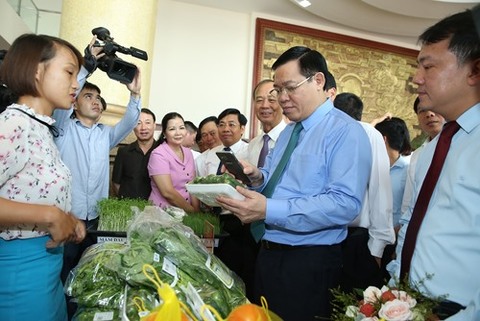
Deputy Prime Minister Vuong Dinh Hue attends a forum on production and consumption of litchi and 52 key agricultural products in Bac Giang Province on Friday. – Photo VGP
The northern province of Bac Giang should pay more attention to development plans for regions growing lychee trees and closely follow market demands.
Deputy Prime Minister Vuong Dinh Hue made the statement at a forum on production and consumption of litchi and 52 key agricultural products held in Bac Giang Province on Friday by provincial People’s Committee.
This year, Bac Giang has harvested a large volume of lychee at a high selling price, but should improve post-harvest storing and processing of lychee, Hue said. The province should develop co-operatives to produce and trade lychee and other major products at a large scale.
The deputy PM asked China to create favoUrable conditions for customs clearance of Viet Nam’s agricultural products.
In addition, Bac Giang should focus on logistics to support the distribution of lychee and work with the border provinces and cities to promote consumption of this product.
Especially, the provincial authorities should collaborate with Chinese agencies to help businesses of two countries trade lychees. That would lead to official trade contracts, reducing risk for both lychee growers and consumers.
In addition, the province should promote the application of technology and production models according to the standards of GlobalGAP and VietGAP.
Meanwhile, he asked the Ministry of Industry and Trade and the Ministry of Agriculture and Rural Development to negotiate with countries that Viet Nam has signed free trade deals with to export agricultural products.
To promote the consumption of lychee at home and abroad, deputy minister of industry and trade Do Thang Hai said Bac Giang needs to maintain stability in areas growing lychee trees and increase areas growing lychee according to the standards of VietGAP and GlobalGAP. That would ensure clean standards for products.
For the domestic market, it is important to continue to promote the consumption of lychee by connections between production regions of the farming products and wholesale markets, trade centres and supermarkets, Hai said.
During the forum, representatives of farming districts in Bac Giang province proposed the township authorities of Pingxiang Town, Hekou District, Guangxi province, China help agricultural products get customs clearance as soon as possible.
Representatives of Lang Son and Lao Cai provinces pledged to not let agricultural products export stagnated at the border gate and to work with Chinese authorities in solving difficulties in import and export activities.
Chinese representatives lauded the quality of Bac Giang lychees this year and said they will try to quickly solve customs procedures. There are more than 200 traders purchasing large numbers in the districts of Bac Giang Province and some localities of Hai Duong Province.
Duong Van Thai, deputy chairman of Bac Giang Province People’s Committee, said this year, Bac Giang has 28,000ha growing lychee trees, 1,000ha less than last year. It is expected to have output of 150-180 thousand tonnes, including 90,000 tonnes developed under VietGAP standards and 10,000 tonnes under GlobalGAP standards.
Tran Quang Tan, director of Bac Giang Department of Industry and Trade, said the provincial People’s Committee has a plan to promote lychee consumption and State agencies and sectors would have production and business plans for the fruit.
This year, the province expects to sell about 80,000-90,000 tonnes at home, accounting for 50 per cent of total output, and export the same volume.
In the export market, China is still a big market, with most of the fresh lychee exported to this market.
In addition, Bac Giang will look to increase its exports to the US, EU, Japan, South Korea, Australia and Malaysia and expanding export markets in the Middle East, Thailand and Canada.
Many businesses have registered to buy lychees to export to the US, Australia, EU, Middle East, Canada and Thailand, said Tan. — VNS